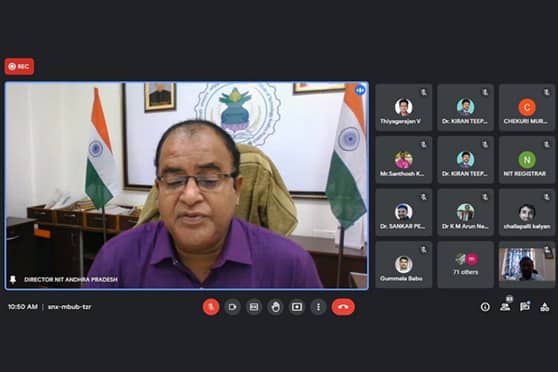NIT Andhra’s training programme provides a platform for researchers in the areas of Smart Power Systems


The National Institute of Technology (NIT) Andhra Pradesh organised a five-day online training in ‘Data-Driven Strategies in Smart Power System and Control-2021’. The event will conclude on November 26.
Data-driven strategies are interdisciplinary in nature and are used in a wide variety of areas of Smart Grid, Power system Stability and Security, Renewable Energy Systems, Microgrids, and Energy Management Systems. This programme aims to equip participants with a basic understanding of data-driven strategies and its frameworks which have established state-of-the-art performance in the fields of power systems and control
The program has been organised under the AICTE Training and Learning (ATAL) Academy, which was established with a vision “To empower faculty to achieve goals of higher education such as access, equity, and quality.”
Addressing the inaugural event, C.S.P. Rao, director - NIT Andhra Pradesh, said, “In recent days, impactful algorithms have Artificial Intelligence (AI) at its core and Electrical Engineering is no exception. Such algorithms have been critical in bridging the void between raising electrical energy demand and depleting energy sources. Power systems in electrical power hold the role of generating, transmitting, and distributing electrical energy; operating such a vast system efficiently is a mammoth task.”
The intervention of renewable energy sources has escalated the complexity of control strategies for the effective operation of the system. Classical Artificial Intelligence-based techniques have handled the complexity to an extent. However, the problem at hand demands customised algorithms which are a fusion of advancements in various fields like machine learning, deep learning, optimization, adaptive control, etc. In this view, the FDP equips with fundamentals needed to understand and explore the advanced algorithms in power systems, Rao further added.
D.M. Vinod Kumar, Department of Electrical Engineering, NIT Warangal, during the first lecture, said, “Smart and Intelligent Computational and Control techniques play a vital role in building the future of Electrical Engineering and become emerging technology in view of future energy demand, climate change, penetration of renewable energy, energy management system and load side demand management. The transformation from the conventional grid to smart grids has many challenges in the case of the Indian scenario particularly. Advanced computational and communication technologies are required to create an end-to-end cyber-enabled electric power system.”
Intelligent data collection devices in the smart grid such as AMI, PMU, WAMS, RTU, SCADA, and IEDs form the backbone for smart power systems and control in Energy Management Systems. Data analytics play a vital role to automate the operation of smart grids including decisions. The students, faculty, and engineers should understand the applications of advanced communication devices, Machine Learning, Artificial Intelligence, Big Data, and Cyber-Physical Systems in the power and energy sector. System-level thinking is the key skill component where a complex electrical system interacts with computing and data systems, he further explained.
Recognising the importance of data-driven techniques, which have grown over the years due to several factors, the institute organised the training for researchers that covered:
⮚ Wide area active control
⮚ Adaptive protection and control
⮚ Network management and devices
⮚ Advanced sensors and measurements
⮚ Knowledge extraction by intelligent methods
⮚ Developments in modelling and control of Smart Grids
⮚ Demand-side management in Smart Grid
⮚ Impact of Artificial Intelligence on Missile Weapon Systems Design
⮚ Advanced optimisation techniques on hybrid power systems with electric vehicles.
The top outcomes from this five-day online training included:
⮚ Awareness of data-driven methods in smart power systems and controlling applications.
⮚ Hands-on experience on simulation of fundamentals on deep learning models using Python and its applications in power systems.
⮚ Hands-on experience on Simscape Onramp in MATLAB.
⮚ Explore the knowledge on the Impact of Artificial Intelligence on Missile Weapon Systems Design.